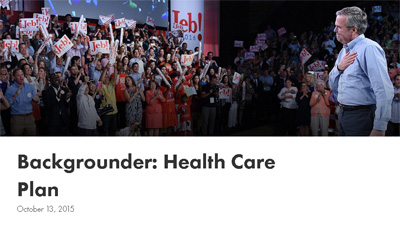The standard-issue conservative “replacement” for Obamacare is a familiar hodgepodge of tax credits, health savings accounts, high-risk pools, block granting of Medicaid, tort reform, and interstate purchase of health plans. Today, Jeb Bush has broken the rules and offered up a plan that only includes the first four.
If you’re grading on a curve, that’s a promising start, and Jeb makes things even more interesting by actually offering up a fairly detailed set of alternatives to Obamacare. I’m not sure any Republican candidate  has gone anywhere near as far as he has. A few highlights:
has gone anywhere near as far as he has. A few highlights:
- He wants to “promote innovation” by speeding up FDA approvals, increasing funding for the NIH, establishing national standards for electronic health records (but, oddly, removing any incentive to abide by them), and conducting a “regulatory spring cleaning.” Some of this is standard conservative stuff, but not all of it.
- His plan provides a tax credit that can be used to buy private health insurance for anyone who doesn’t get health insurance through their employer. However, it sounds like the credit would be pretty small, probably on the order of a few thousand dollars.
- He wants to broaden the use of health savings accounts.
- He wants to get rid of Obamacare’s “Cadillac tax,” but he would replace it with something that sounds to me like it’s basically identical. Maybe I’m missing something here.
- “States would be held accountable to ensure access for individuals with pre-existing conditions.” There’s a fair amount of gibberish here, and even Jeb doesn’t seem especially confident that it will work. However, it’s meaningless anyway since insurance companies wouldn’t be required to offer policies at the same rate to everyone (aka “community rating”). “States would report on access to care,” but that’s it. It appears that there’s nothing in Jeb’s plan that prevents insurance companies from simply charging sky-high prices to anyone with a pre-existing condition.
- There is, of course, no mandate to buy insurance. This would be catastrophic for insurance companies, except for the fact that Jeb’s plan doesn’t require them to cover patients with pre-existing conditions in the first place.
- Jeb almost fooled me by not mentioning block-granting of Medicaid. But of course that’s in there. He calls it “capped allotments” and pairs it up with a proposal to essentially deregulate state Medicaid plans completely but still “hold states accountable for outcomes”—though there’s not a single word about exactly what this means. Jeb’s allotments would grow at the rate of inflation, which means they’d get smaller every year since medical costs typically grow faster than inflation.
Just about every serious health care plan that truly wants to expand coverage relies on a three-legged stool: mandates, community rating, and federal subsidies. Jeb’s plan doesn’t include the first two and offers only a stingy version of the third. It’s much more detailed than your average Republican plan, but in the end it would probably expand coverage hardly at all.















